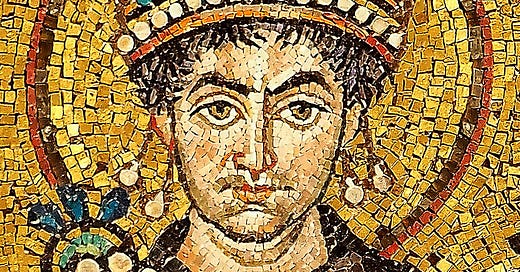Today the Church commemorates Emperor Justinian, Christian ruler and confessor. Also known as Justinian the Great, the Emperor of the Byzantine Empire was born in Tauresium, Dardania around A.D. 482. He was born a native Latin speaker to a peasant family. He was later adopted by his uncle Justin, from whom the name Iustinianus (or, Justinian) came. Justin’s sister, Vigilantia, was Justinian’s mother. Justin brought the young Justinian to Constantinople, where he was given an illustrious education. Justinian was well-educated in jurisprudence, theology, and Roman history.
When Emperor Anastasius died in 518, Justin was proclaimed the new emperor with substantial assistance from Justinian, who demonstrated great ambition. This has led several sources to claim that Justinian was functioning as virtual regent well before Justin proclaimed him associate emperor. Upon Justin’s mental and cognitive decline, Justinian became the de facto ruler. Justinian was soon appointed consul and commander of the army of the east, and in 525 was granted the titles of nobilissimus and caesar (that is, heir-apparent). He was crowned co-emperor on April 1, 527, and became sole emperor after Justin's death on August 1, 527.
Justinian’s rule was marked by great ambition, undoubted intelligence, and strong religious convictions. Referred to as “the emperor who never sleeps,” Justinian possessed great energy and an undeniable thirst for unity. He focused on the restoration of unity among a divided Church, seeking agreement between the parties who had become divided over the Person of Christ.
In the civil realm, Justinian is remembered as one of the most spectacular conquerers in the history of the Byzantine Empire. During his reign, his army recovered large stretches of land around the Western Mediterranean basin that had escaped Imperial control sometime in the 5th century. As a Christian ruler, Justinian considered it his divine duty to restore the Roman Empire to its ancient boundaries. Though he never personally took part in military campaigns, he boasted of his many successes in his various writings.
Justinian considered rejection of religious orthodoxy to be one of greatest threats to the Byzantine Empire. His insatiable quest for religious unity was fueled by his unwavering confession of the Christology of the Council of Chalcedon. He rejected the Monophysite heresy, which taught that in the Person of Christ there is only one divine nature, rather than two distinct natures—that is, the divine nature and the human nature. Justinian’s wife, Theodora, whose influence throughout Justinian’s rule is undeniable, sympathized with the Monophysites and may have advocated for them in the court in Constantinople.
He regulated many facets of public life, both in religion and in law. At the very beginning of his reign, he deemed it proper to promulgate by law the Church's belief in the Trinity and the Incarnation, and to threaten heretics with appropriate penalties. He subsequently declared that he intended to deprive all perverters of orthodoxy of the opportunity for such offense by due process of law. He took seriously the threats that religious heresies posed to the sound doctrine of the Church.
Justinian achieved general unity between the West and the East, though conflict continued to exist throughout the East. He reigned according to faith, seemingly establishing faith as a prerequisite for political rule. Especially in the sixth century, the protection of the Church was, for many rulers, an indispensable priority.
Under Justinian’s rule, the agriculture and subsequently the economy thrived in the Byzantine Empire. Natural disasters, plagues, and lack of manpower did, among other things, disturb the general success that Justinian had achieved, but he nevertheless demonstrated great ambition and strong religious conviction.
He is remembered today as a stalwart defender of Christian orthodoxy and a proponent of the supremacy of faith in the civil and political realms. His ambition drove him to achieve great accomplishments throughout his reign, which lasted for nearly 40 years. He died in 565, at 83 years old. His life was marked by his steadfastness to the Word of God and his unwavering dedication to the Empire. Justinian’s life and political demonstrates sets forth an ideal image of the political climate for which we could only hope, and he remains one of the greatest Christian rulers in history.




